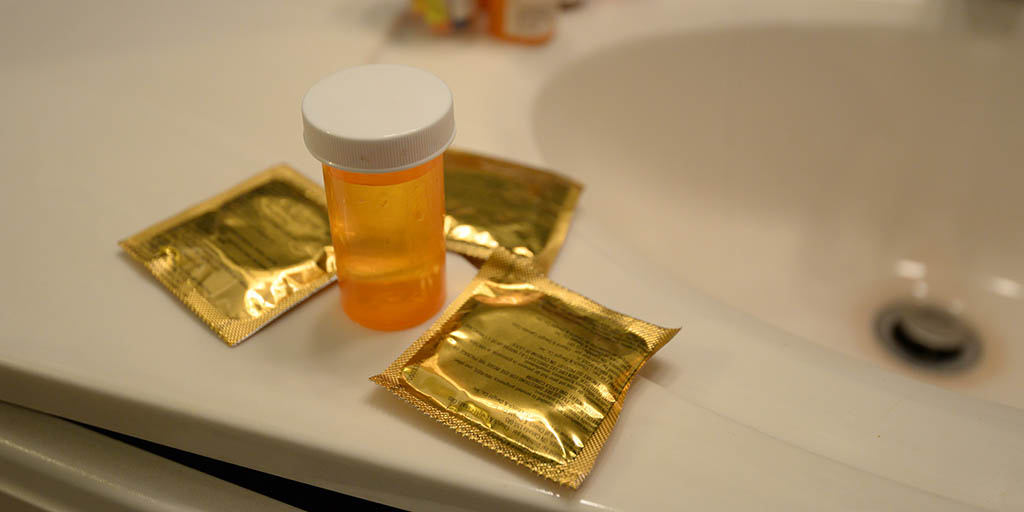Chlamydia in London highest among college-aged
 CREDIT: MARLON FRANCIS
CREDIT: MARLON FRANCISUsing condoms can help prevent contracting sexually transmitted infections (STIs), while getting tested regularly will help prevent spreading them.
With the return to school comes the return of assignments, exams, the balancing of workloads but most importantly, an increase in social activities. The social side of education is the overpass of higher education that offers the greatest potential for the sharing of unwanted stimulus: sexually transmitted infections (STIs).
Sometimes we can get so caught up in having a good time, doing away with educational stresses or just giving into our inhibitions that we can overlook the potential of taking home more than we bargained for after a sexual rendezvous has run its course. The Middlesex London Health Unit (MLHU) was here to help students navigate taking responsibility for their physical health by holding a Pee for Pizza drive that was held in Forwell Hall as part of the Fanshawe Student Union’s (FSU) Sexual Awareness Fair on Sept. 19.
“We see the highest rates of chlamydia in the 15 to 24 age range,” said Kim Primok, a public health nurse from the MLHU who was at the event. “In London-Middlesex we saw over 2,000 chlamydia cases last year, so that’s part of why we do this.”
Primok explained that the urine tests detected signs of chlamydia as well as gonorrhea, which are both bacterial STIs that are spread through vaginal, anal and oral sex.
Both STIs are curable with a simple antibiotic. However, it is common for them to go undetected for an extended period of time.
“A lot times, these STIs don’t have any symptoms,” Primok said. “Someone might be telling another partner with their whole heart, saying ‘I’m clean, I know I’m clean’, but if they’ve never been tested before they really don’t know for sure. So that would be taking care of themselves and their sexual partner or partners.”
Maintenance is a question of prevention versus treatment. Anxiety associated with going to an STI clinic for a checkup and the stigma of uncleanliness are relatively small prices to pay to offset the potential for serious illness and future complications.
If untreated, those afflicted could experience major illness, pelvic inflammatory disease (PID), which can lead to long-term pelvic pain, blocked fallopian tubes, infertility and pregnancy complications.
The preventative measures that exist are the same ones we’ve heard of for decades, such as ‘wrap it up’. The use of condoms greatly decreases the chances for STI contraction, but if affected areas are not covered then the use of condoms and other preventative equipment will not be as effective. The only way to truly avoid the chance of contraction is that of abstinence, an option not often volunteered for. The use of silicone and water-based lubes also helps the function of condoms and helps to prevent breaks or tears that can increase the possibility of STI exchange.
STIs can affect all walks of life and does not discriminate against sexual preference, affecting straight, gay, lesbian, bi and trans inclusively. Wishful thinking and positive expectations are not responsible tools for combating these diseases. Have conversations with partners, use protection and get yourself regularly checked if you’re being sexually active.
Outside of the Pee for Pizza events, testing for STIs can be done at the MLHU STI Clinic, located at 50 King St., every Monday and Wednesday evening from 4:30 p.m. to 7 p.m. There is also a testing clinic at the same location on every Friday morning from 8:30 a.m. to 10:30 a.m. Primok said presenting a health card is not necessary.
STI testing and counselling is also available at the Fowler Kennedy Sport Medicine Clinic in the Wellness Centre, Room J 1004. For hours and additional info check out their website at fowlerkennedy.com/services/for-fanshawe-students. A health is required at this location, which is appointment-based.
If anyone’s coming to get tested they should be proud about it and be proud because they’re taking care of themselves and their sexual partners,” Primok said.















